Personal Reflection on Introduction to Health Science Research Course
VerifiedAdded on 2022/10/19
|5
|903
|9
Journal and Reflective Writing
AI Summary
This document is a personal reflection on a student's experience in the Introduction to Health Science Research course. The student reflects on the definition of research, its importance, and how the course has expanded their existing knowledge and skills. The reflection covers various aspects, including data collection methods, scientific report writing, and different study designs (quantitative and qualitative). The student emphasizes the relevance of the course content to their future career as a healthcare provider, highlighting the importance of evidence-based approaches and research in public health. The reflection also identifies areas for further learning, such as refining research topics. The student acknowledges the course's value and expresses a desire for more time allocated to it.
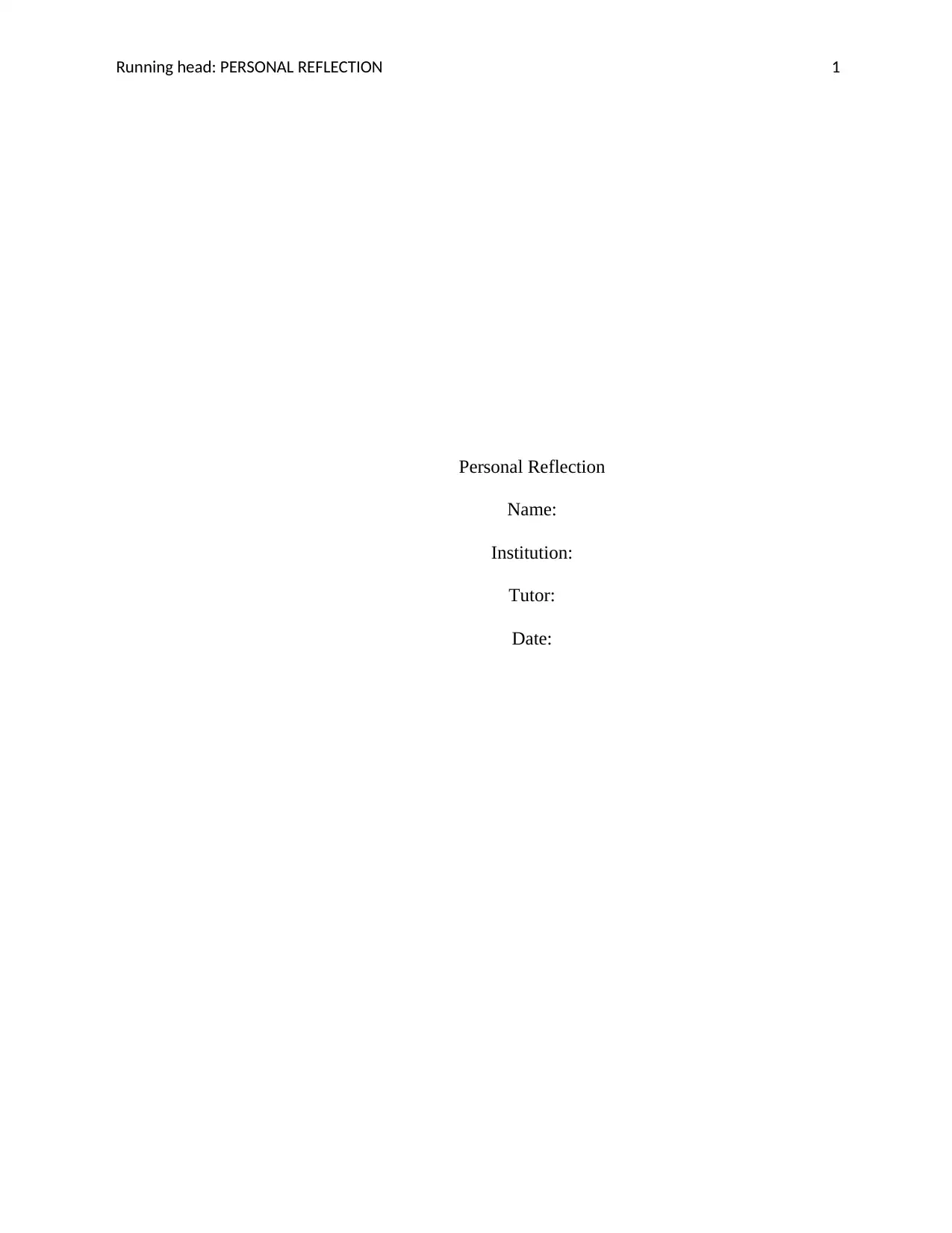
Running head: PERSONAL REFLECTION 1
Personal Reflection
Name:
Institution:
Tutor:
Date:
Personal Reflection
Name:
Institution:
Tutor:
Date:
Paraphrase This Document
Need a fresh take? Get an instant paraphrase of this document with our AI Paraphraser
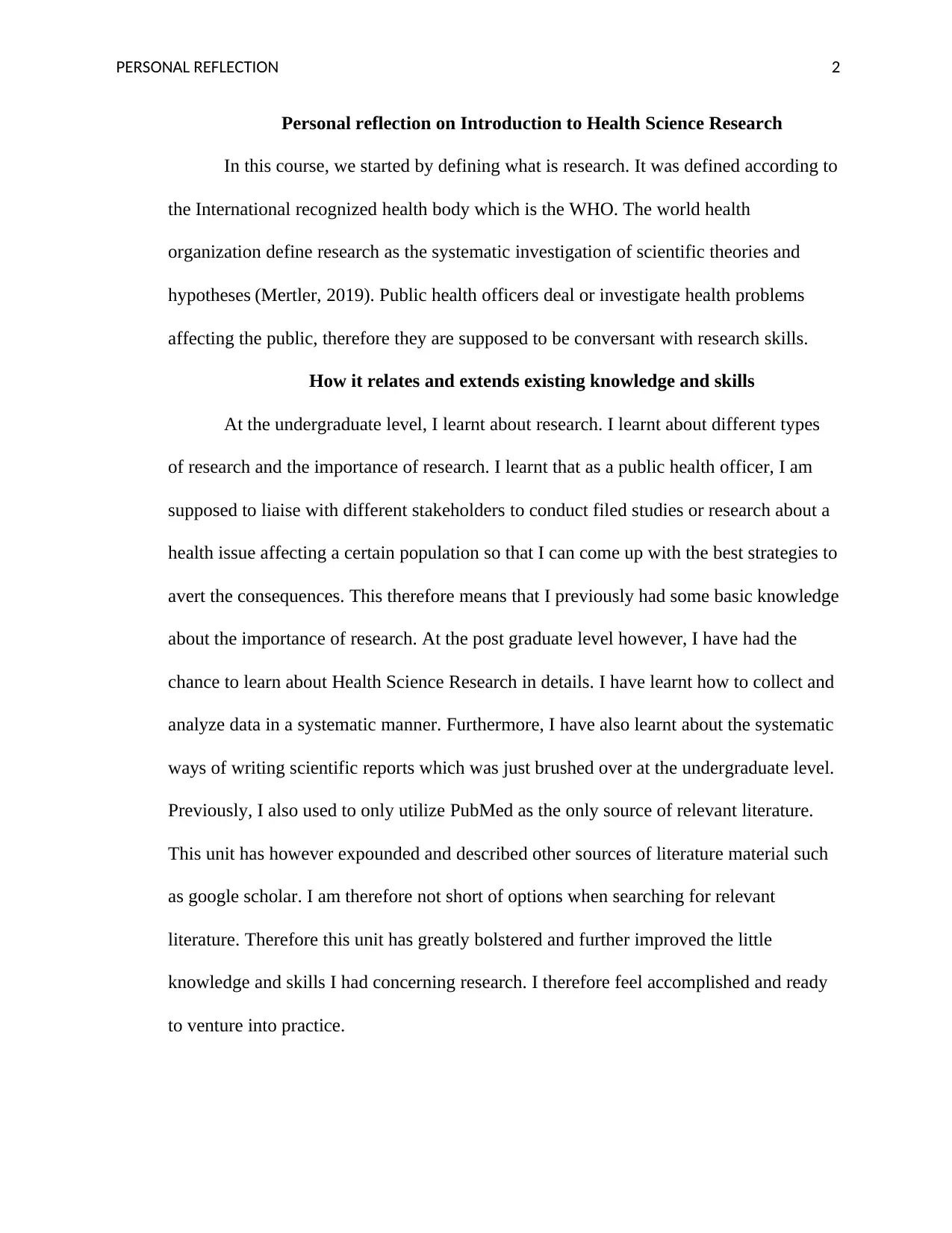
PERSONAL REFLECTION 2
Personal reflection on Introduction to Health Science Research
In this course, we started by defining what is research. It was defined according to
the International recognized health body which is the WHO. The world health
organization define research as the systematic investigation of scientific theories and
hypotheses (Mertler, 2019). Public health officers deal or investigate health problems
affecting the public, therefore they are supposed to be conversant with research skills.
How it relates and extends existing knowledge and skills
At the undergraduate level, I learnt about research. I learnt about different types
of research and the importance of research. I learnt that as a public health officer, I am
supposed to liaise with different stakeholders to conduct filed studies or research about a
health issue affecting a certain population so that I can come up with the best strategies to
avert the consequences. This therefore means that I previously had some basic knowledge
about the importance of research. At the post graduate level however, I have had the
chance to learn about Health Science Research in details. I have learnt how to collect and
analyze data in a systematic manner. Furthermore, I have also learnt about the systematic
ways of writing scientific reports which was just brushed over at the undergraduate level.
Previously, I also used to only utilize PubMed as the only source of relevant literature.
This unit has however expounded and described other sources of literature material such
as google scholar. I am therefore not short of options when searching for relevant
literature. Therefore this unit has greatly bolstered and further improved the little
knowledge and skills I had concerning research. I therefore feel accomplished and ready
to venture into practice.
Personal reflection on Introduction to Health Science Research
In this course, we started by defining what is research. It was defined according to
the International recognized health body which is the WHO. The world health
organization define research as the systematic investigation of scientific theories and
hypotheses (Mertler, 2019). Public health officers deal or investigate health problems
affecting the public, therefore they are supposed to be conversant with research skills.
How it relates and extends existing knowledge and skills
At the undergraduate level, I learnt about research. I learnt about different types
of research and the importance of research. I learnt that as a public health officer, I am
supposed to liaise with different stakeholders to conduct filed studies or research about a
health issue affecting a certain population so that I can come up with the best strategies to
avert the consequences. This therefore means that I previously had some basic knowledge
about the importance of research. At the post graduate level however, I have had the
chance to learn about Health Science Research in details. I have learnt how to collect and
analyze data in a systematic manner. Furthermore, I have also learnt about the systematic
ways of writing scientific reports which was just brushed over at the undergraduate level.
Previously, I also used to only utilize PubMed as the only source of relevant literature.
This unit has however expounded and described other sources of literature material such
as google scholar. I am therefore not short of options when searching for relevant
literature. Therefore this unit has greatly bolstered and further improved the little
knowledge and skills I had concerning research. I therefore feel accomplished and ready
to venture into practice.
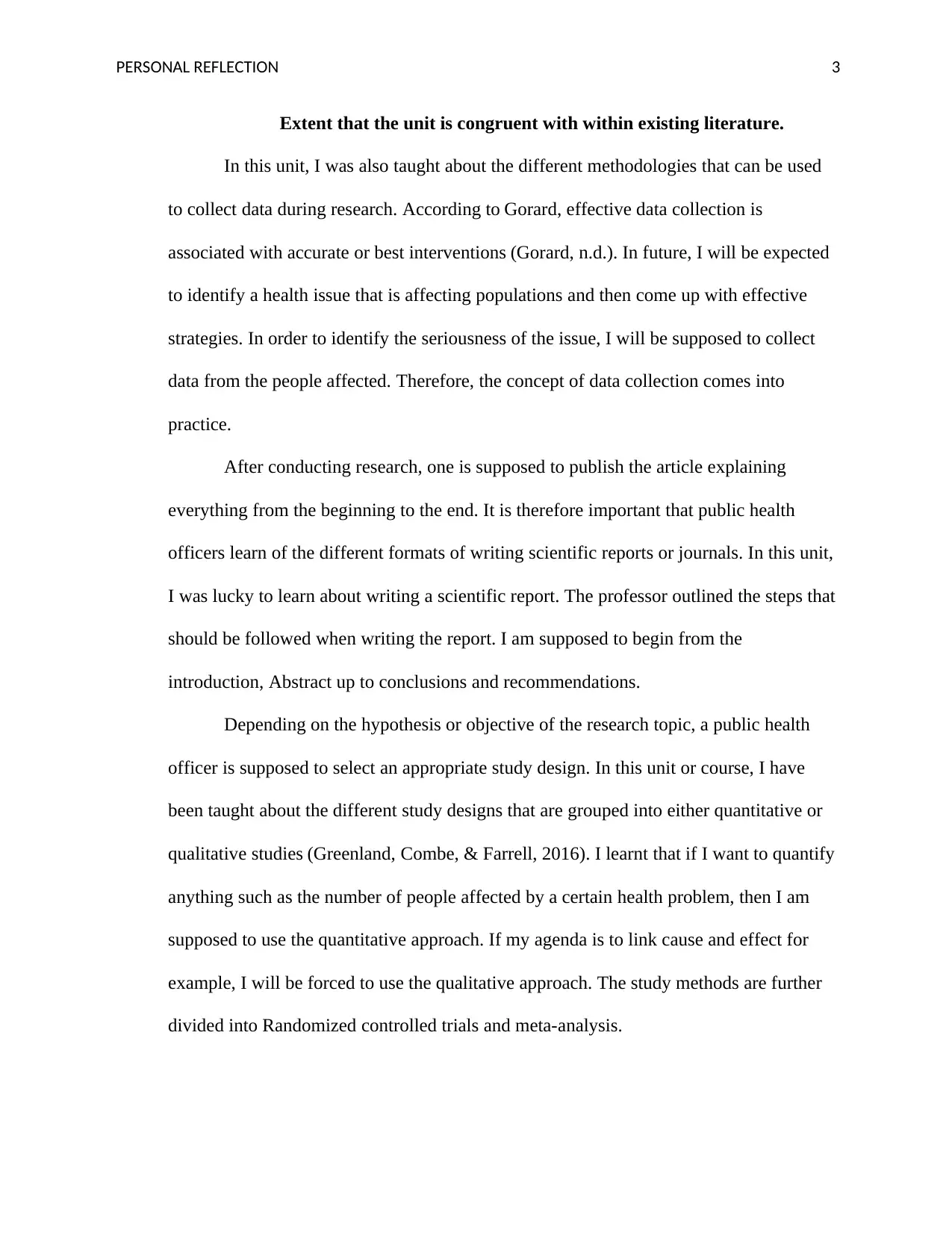
PERSONAL REFLECTION 3
Extent that the unit is congruent with within existing literature.
In this unit, I was also taught about the different methodologies that can be used
to collect data during research. According to Gorard, effective data collection is
associated with accurate or best interventions (Gorard, n.d.). In future, I will be expected
to identify a health issue that is affecting populations and then come up with effective
strategies. In order to identify the seriousness of the issue, I will be supposed to collect
data from the people affected. Therefore, the concept of data collection comes into
practice.
After conducting research, one is supposed to publish the article explaining
everything from the beginning to the end. It is therefore important that public health
officers learn of the different formats of writing scientific reports or journals. In this unit,
I was lucky to learn about writing a scientific report. The professor outlined the steps that
should be followed when writing the report. I am supposed to begin from the
introduction, Abstract up to conclusions and recommendations.
Depending on the hypothesis or objective of the research topic, a public health
officer is supposed to select an appropriate study design. In this unit or course, I have
been taught about the different study designs that are grouped into either quantitative or
qualitative studies (Greenland, Combe, & Farrell, 2016). I learnt that if I want to quantify
anything such as the number of people affected by a certain health problem, then I am
supposed to use the quantitative approach. If my agenda is to link cause and effect for
example, I will be forced to use the qualitative approach. The study methods are further
divided into Randomized controlled trials and meta-analysis.
Extent that the unit is congruent with within existing literature.
In this unit, I was also taught about the different methodologies that can be used
to collect data during research. According to Gorard, effective data collection is
associated with accurate or best interventions (Gorard, n.d.). In future, I will be expected
to identify a health issue that is affecting populations and then come up with effective
strategies. In order to identify the seriousness of the issue, I will be supposed to collect
data from the people affected. Therefore, the concept of data collection comes into
practice.
After conducting research, one is supposed to publish the article explaining
everything from the beginning to the end. It is therefore important that public health
officers learn of the different formats of writing scientific reports or journals. In this unit,
I was lucky to learn about writing a scientific report. The professor outlined the steps that
should be followed when writing the report. I am supposed to begin from the
introduction, Abstract up to conclusions and recommendations.
Depending on the hypothesis or objective of the research topic, a public health
officer is supposed to select an appropriate study design. In this unit or course, I have
been taught about the different study designs that are grouped into either quantitative or
qualitative studies (Greenland, Combe, & Farrell, 2016). I learnt that if I want to quantify
anything such as the number of people affected by a certain health problem, then I am
supposed to use the quantitative approach. If my agenda is to link cause and effect for
example, I will be forced to use the qualitative approach. The study methods are further
divided into Randomized controlled trials and meta-analysis.
⊘ This is a preview!⊘
Do you want full access?
Subscribe today to unlock all pages.

Trusted by 1+ million students worldwide
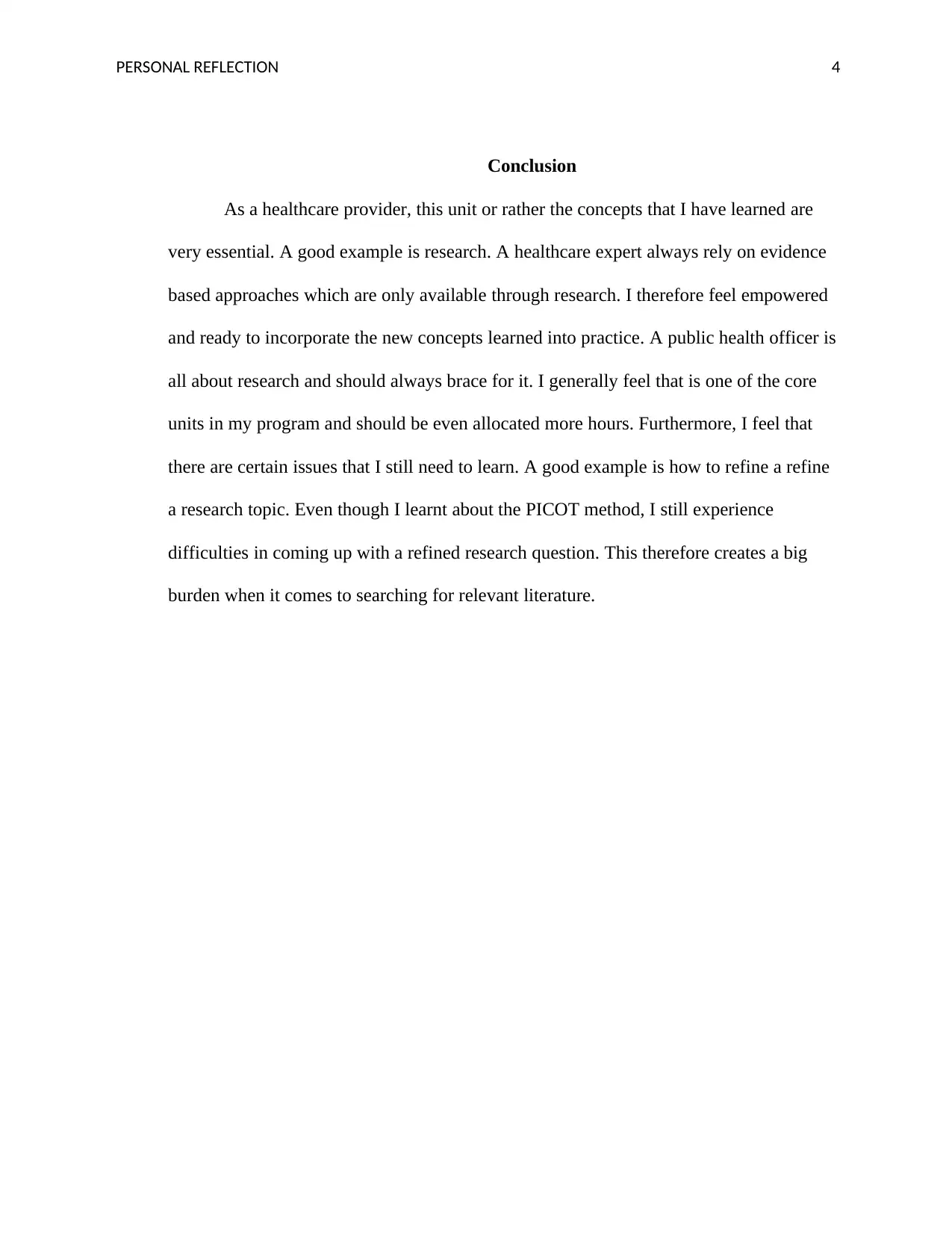
PERSONAL REFLECTION 4
Conclusion
As a healthcare provider, this unit or rather the concepts that I have learned are
very essential. A good example is research. A healthcare expert always rely on evidence
based approaches which are only available through research. I therefore feel empowered
and ready to incorporate the new concepts learned into practice. A public health officer is
all about research and should always brace for it. I generally feel that is one of the core
units in my program and should be even allocated more hours. Furthermore, I feel that
there are certain issues that I still need to learn. A good example is how to refine a refine
a research topic. Even though I learnt about the PICOT method, I still experience
difficulties in coming up with a refined research question. This therefore creates a big
burden when it comes to searching for relevant literature.
Conclusion
As a healthcare provider, this unit or rather the concepts that I have learned are
very essential. A good example is research. A healthcare expert always rely on evidence
based approaches which are only available through research. I therefore feel empowered
and ready to incorporate the new concepts learned into practice. A public health officer is
all about research and should always brace for it. I generally feel that is one of the core
units in my program and should be even allocated more hours. Furthermore, I feel that
there are certain issues that I still need to learn. A good example is how to refine a refine
a research topic. Even though I learnt about the PICOT method, I still experience
difficulties in coming up with a refined research question. This therefore creates a big
burden when it comes to searching for relevant literature.
Paraphrase This Document
Need a fresh take? Get an instant paraphrase of this document with our AI Paraphraser
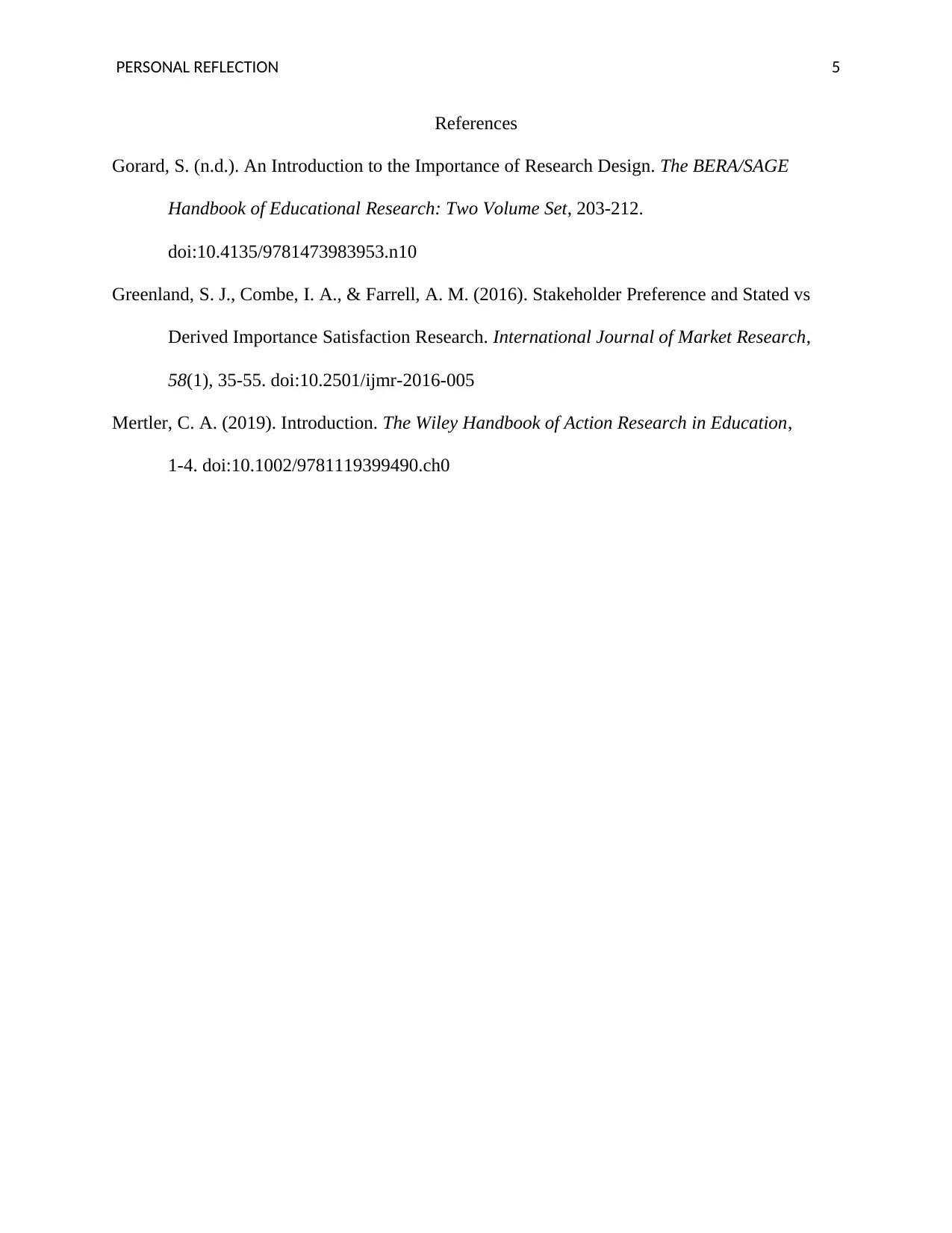
PERSONAL REFLECTION 5
References
Gorard, S. (n.d.). An Introduction to the Importance of Research Design. The BERA/SAGE
Handbook of Educational Research: Two Volume Set, 203-212.
doi:10.4135/9781473983953.n10
Greenland, S. J., Combe, I. A., & Farrell, A. M. (2016). Stakeholder Preference and Stated vs
Derived Importance Satisfaction Research. International Journal of Market Research,
58(1), 35-55. doi:10.2501/ijmr-2016-005
Mertler, C. A. (2019). Introduction. The Wiley Handbook of Action Research in Education,
1-4. doi:10.1002/9781119399490.ch0
References
Gorard, S. (n.d.). An Introduction to the Importance of Research Design. The BERA/SAGE
Handbook of Educational Research: Two Volume Set, 203-212.
doi:10.4135/9781473983953.n10
Greenland, S. J., Combe, I. A., & Farrell, A. M. (2016). Stakeholder Preference and Stated vs
Derived Importance Satisfaction Research. International Journal of Market Research,
58(1), 35-55. doi:10.2501/ijmr-2016-005
Mertler, C. A. (2019). Introduction. The Wiley Handbook of Action Research in Education,
1-4. doi:10.1002/9781119399490.ch0
1 out of 5
Related Documents
Your All-in-One AI-Powered Toolkit for Academic Success.
+13062052269
info@desklib.com
Available 24*7 on WhatsApp / Email
![[object Object]](/_next/static/media/star-bottom.7253800d.svg)
Unlock your academic potential
Copyright © 2020–2026 A2Z Services. All Rights Reserved. Developed and managed by ZUCOL.





